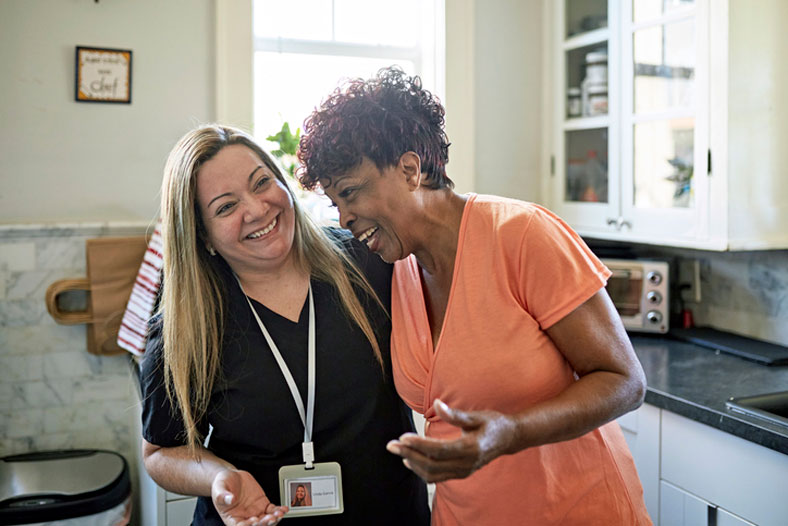Written by Sam Medley

In the past, young professionals and immigrant families flocked to California and kept the state’s population young. But while that trend hasn’t necessarily died, many experts believe it may soon be reversing.
By 2060, the California Department of Aging expects the state’s 60-and-over population to increase by 166%. In some counties, it could increase by more than 200%. In that same period, the 85-and-older population is projected to grow by an astounding 489% statewide.
Featured Programs:Sponsored School(s)
However, the Graying of California isn’t just a problem for the future — it’s a crisis for the here and now. More than 16% of California seniors live in poverty. Most of the state’s middle class seniors won’t be able to afford assisted living in the coming years. So even though they so desperately need help with mental h2200ealth, social isolation, chronic illnesses, and cognitive decline, many seniors may be forced to face these inevitable challenges alone.
If you’re considering a career in social work, becoming a gerontology social worker means you’ll be on the frontlines helping some of California’s most vulnerable citizens avoid this impending crisis. But what exactly does a social worker do to help the elderly? Where might you find a job? And, most importantly, how do you prepare for it?
What Does a Gerontology Social Worker Do?
Gerontology social workers help seniors live out their golden years happily and safely. This means they must typically address common issues in aging like cognitive and physical decline and financial instability.
To address these challenges, gerontology social workers often:
- Conduct assessments of their clients’ physical, cognitive, emotional, and social needs.
- Develop care plans to address long- and short-term issues.
- Coordinate care between professionals like doctors, mental health practitioners, and legal advocates.
- Connect seniors to insurance, housing, and financial aid programs.
- Inform and educate other caregivers.
- Provide counseling to seniors, their family members, and overburdened caregivers.
- Advocate for their clients’ medical, legal, and financial rights.
- Run support groups for seniors going through similar issues as well as their loved ones.
- Conduct research to assess the effectiveness of different programs, uncover new problems faced by seniors, and craft policies that protect this vulnerable population.
Some gerontology professionals only focus on one or just a few of these duties. Others provide more holistic services. The exact scope of a professional’s responsibilities is typically defined by their exact role and what type of organization they work for.
Other Gerontology Social Work Job Opportunities and Titles
Each type of senior social service provider employs multiple types of elder care experts. So while you may want to become a gerontology social worker in California, your career options aren’t limited to that title.
Depending on your education, experience, and skill set, you may want to investigate roles as a:
- Senior health educator
- Personal care assistant or caregiver
- Home health aide
- Grief counselor
- Case manager
- Elder abuse prevention specialist
- Licensed Clinical Social Worker (LCSW)
- Senior services director or program manager
Some of these roles may require additional training or certification. In the case of service directors and other administrators, employers may require you to have a Master’s in Social Work and some experience in personnel management. Similarly, LCSWs must go through a rigorous training and licensing process. Fortunately, many MSW programs in California allow students to specialize in these areas and more.
Where Do Gerontology Social Workers Work?
Even though gerontology social workers help a very specific segment of the population, their work environments are surprisingly diverse. Depending on your career goals, here are a few places you might work
Assisted Living Communities, Nursing Homes, and Other Residential Facilities
Aging adults who can no longer live safely at home often live in senior living communities. Assisted living communities are for seniors who have some independence, but need help with certain activities of daily living such as eating, walking, dressing, cooking, or monitoring medication. Nursing homes are for seniors who need around-the-clock medical supervision.
In these settings, social workers are often responsible for intake assessment, coordinating with outside healthcare providers, and providing day-to-day care. However, they’re also typically involved in planning events, providing counseling, working with families, and helping seniors transition to and from different levels of care.
Home Healthcare Agencies

Seniors who can or wish to age in their own homes often seek help from home healthcare agencies. Social workers who work for these organizations often have similar responsibilities to their colleagues at residential communities. However, they must also be prepared to help seniors move to communal settings when necessary and train family members in caring for their loved one.
Community Senior Centers
Considering the social isolation many seniors face, senior centers aren’t just places to meet people and learn new skills — they can be a lifeline. Social workers often help plan events, educational programs, and support group meetings. They can also help staff identify particularly vulnerable patrons and help them access the resources they need.
Healthcare Facilities
While many gerontology social workers work in nursing homes, other healthcare facilities like hospitals and rehabilitation clinics employ them to ensure their older patients are getting the proper care.

In healthcare settings, social workers may also help coordinate aftercare, advocate for patients’ medical rights, and assist families. This means they must also be familiar with HIPAA laws and Medicare policies.
Hospice Care Providers
Entering end-of-life care can be financially, emotionally, and legally taxing on seniors and their loved ones alike. Social workers working in hospice care facilities provide the counseling necessary to process difficult emotions and can even help families with estate planning and other legal issues.
Mental Healthcare Providers
Some mental health clinics and private mental health practices employ social workers to focus on serving their older clients’ unique needs. However, senior mental health specialists can be found in any number of other environments like hospitals and assisted living communities. Many of these types of professionals earn Masters in Social Work (MSW) so they can become Licensed Clinical Social Workers (LCSWs) and provide advanced mental health treatments.
Passionate about improving mental healthcare access for seniors all across California? Learn how to become a Licensed Clinical Social Worker and do just that.
Legal and Financial Firms
Late life can be full of complex legal issues. Many legal and financial firms hire or work closely with gerontology social workers on estate planning, guardianship issues, and retirement planning.

Social workers can also intervene in cases of elder abuse and neglect whether it’s done by an individual or a senior care facility. This is especially important for seniors suffering from serious cognitive issues like Alzheimer’s and dementia.
Colleges, Universities, and Research Institutions
To improve frontline services, senior social service agencies of all kinds rely on vast amounts of research and data. Social workers with backgrounds in research can find jobs with any number of state, county, and local social service agencies. In these roles, workers often canvas the local population, conduct surveys, and exam public health data for relevant trends. Many colleges, private research firms, and national senior advocacy organizations also conduct this kind of work.
Government Agencies
National, state, county, and city government social service agencies employ gerontology social workers to do almost every kind of job. Some administer services directly to clients. Others oversee entire programs and teams of social workers. Still more work with private service providers to ensure their facilities and services meet all federal and local regulations.
Private Practices
After gaining experience, some social workers decide to open private clinical gerontological social work practices in their local communities. These agencies can provide any amount of services from estate planning to mental health counseling. But due to state licensing laws, only Licensed Clinical Social Workers are allowed to operate private practices in California.
Where To Find Gerontology Social Work Jobs in California
The amount of places an aging care social worker can work is certainly encouraging to anyone thinking about entering the field. But what’s even more promising is the vast number of senior-focused organizations that call California home.
While each city and county has its own mix of employers, some of California’s biggest senior social service providers include:
- California Department of Aging (CDA). The CDA is a statewide senior service agency that provides in-home, residential, healthcare, nutrition, and legal service and more. The CDA also works closely with a large number of more local care providers.
- Area Agencies on Aging. This network of 33 county and city government senior social providers provides services to aging adults in their local areas. Many Area Agencies on Aging are departments of larger social and human service agencies.
- California Health Care Foundation (CHCFA). Though not dedicated solely to senior health, the CHCFA is one of the state’s largest nonprofit health advocacy groups. They host leadership programs, conduct research, and publish health-focused journals to make healthcare accessible to all, particularly the most vulnerable populations like seniors.
- Institute on Aging (IOA). The Institute on Aging is an adult day care center in San Francisco. However, in addition to operating this community, the IOA helps seniors in seven counties connect with vital financial resources, helps seniors transition into safer living environments, advocates for senior-friendly policies, and operates the San Francisco city government’s elder abuse prevention program.
- Veterans Homes of California. The California Department of Veterans Affairs (CalVet) operates eight long-term senior care homes across the state. These communities range from independent living to skilled nursing care.
These are only some of the largest senior social service agencies in California. The state is home to hundreds of hospitals, clinics, universities, and independent service providers who all help seniors age with dignity in their own way.
How To Become a Gerontology Social Worker in California
In many states, all social workers need state-issued licenses before they’re allowed to start working. But according to the California Chapter of the National Association of Social Workers, only LCSWs are required to get a license in California. This means that gerontology social workers in the state generally aren’t required to have a specific degree to start working.
However, government agencies, non-profits, and independent service providers of all kinds often prefer candidates with social work degrees. A bachelor’s in social work (BSW) may help you get an entry-level gerontology social work position. This might include a role as a social worker, support group counselor, or case manager. BSW programs typically include classes on foundational social work principles and require students to complete a supervised fieldwork experience.

For more advanced positions, many employers require applicants to have a Master’s of Social Work. MSW programs typically cover high-level topics like interviewing techniques, mental health disorder diagnosis, and social policy administration. You’ll also be required to complete an in-depth fieldwork experience. At the Master’s level, you can even specialize in gerontology, healthcare, and other related subjects. If you’d like to become an LCSW, the California Board of Behavioral Sciences (the agency that oversees LCSWS and other mental health providers) says having an MSW is a requirement.
Gerontology Social Worker Salaries in California
As of May 2022, the Bureau of Labor Statistics (BLS) reports that the average salary for all social workers in California is between $66,340 and $88,380 depending on specialty. This is considerably higher than the national average range of $56,680 to $64,360.
While the BLS doesn’t track data for gerontology professionals specifically, those who work with seniors may fall into one of three groups the BLS uses to categorize social workers: healthcare social workers, mental health and substance abuse social workers, and social workers (all other).
The following table lists BLS-reported salary information for these three groups in California. The 10% and 25% columns represent the lowest-earning workers in their specialties. They’re often entry-level workers without advanced degrees. Those in the 75% and 90% columns are the highest-earning professionals, many of whom have earned MSWs and become LCSWs. Salaries can also vary based on location and employer.
|
Social Work Specialty |
10% |
25% |
50% (Median) |
75% |
90% |
|
Healthcare Social Workers |
$50,870 |
$63,760 |
$80,790 |
$105,050 |
$133,100 |
|
Mental Health and Substance Abuse Social Workers |
$44,680 |
$54,760 |
$79,530 |
$104,000 |
$126,120 |
|
Social Workers (All Other) |
$42,750 |
$49,120 |
$62,200 |
$86,010 |
$106,760 |
Table data taken from 2022 BLS reports for California.
2022 US Bureau of Labor Statistics job market trends and salary figures for child, family, and school social workers, healthcare social workers, mental health and substance abuse social workers, and social workers (all other) are based on national data, not school-specific information. Conditions in your area may vary. Data accessed August 2023.
Discover more about other social work specializations in California.







